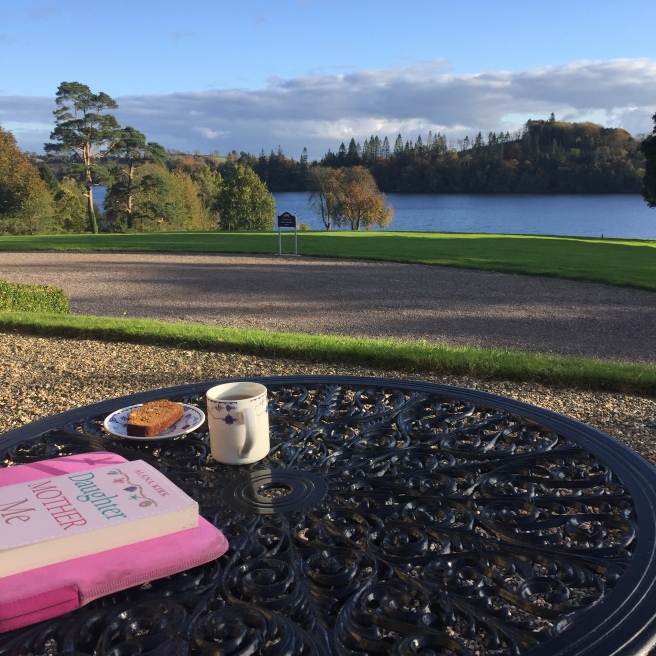
The wonderful Nora Ephron summed it up beautifully when she said in one of the essays from her memoir I Hate my Neck:
“ I can’t believe how real life never lets you down. I can’t understand why anyone would write fiction when what actually happens is so amazing.”
She sings my song. Ephron, of the classic scripts such as ‘When Harry Met Sally’, ‘You’ve Got Mail’ and ‘Sleepless in Seattle’ also wrote about real life in her fictional movies…. because real life is extraordinary. They didn’t have to be thrillers, or mysteries, or fantasy worlds to be fascinating and furiously intense. She had a skill – a skill that memoirists should have – to pull the extraordinary from the ordinary life.
I recently hosted a memoir workshop for the Dalkey Creates Festival, and before we began, I asked all the participants to look around the room and take in the other faces. We were all strangers to each other but I knew, that at the end of this long day, we would all have shared extraordinary elements of our lives. And we did. There were tears, and laughter, and genuine moments of connection. And that is the beauty of writing about self in a way that makes a connection to another person’s experience – even if, despite the fact, the details of their experience are very different from yours.
The popularity of creative non-fiction in recent years has given the idea of memoir a new, modern lease of life. From it’s early form of letters and essays it has now been dominated by the the 70,000 word manuscript in the shape of a book. But for those of you who wish to write about your own experiences and are intimidated by the thought of a full-blown tome, it’s important to remember those early, less wordy forms, as well as new modern ones. Memoir, in it’s true sense of the word, is simply writing about our experiences and reflecting on them with a way that connects to another, whatever the length.
I encourage people to think about memoir in all it’s forms: essays, letters, journals, blogs, short stories, flash fiction, books, articles, newspaper columns, and even short moments of deep shared experience like RTE’s Sunday Miscellany.
Although my memoir about surviving my sandwich years came out this year in the form of a book, I feel I have been ‘memoiring’ most of my life. From magazine travel pieces in my 20’s about my adventures around SE Asia, to a decade blogging about parenting and writing newspaper articles in the ‘i’, I have used my personal memories and experiences to share and connect to others.
Another one of my favourite authors, Alice Walker, a black woman from the southern states of America once said,
“We have the capability to connect to absolutely everyone and everything, and in fact, we are all connected…When I write about my family, about things from the South, the people of China say, “Why, this is very Chinese.”
Glancing over the memoir shelves in recent years, you can see how this area is expanding into all kinds of formats. From Graham Norton’s recent memoir structured under his favourite passions (Ireland, New York, dog etc), to collections of essays (Nora Ephron, Anne Enright), from memoirs developed from blogs (Julia & Julia, mine!), to topic based (Bridget Christie’s book on feminism) to meanderings and thoughts (Ursula le Guin), the traditional idea of memoir is constantly evolving and developing. Personal and subject driven bogs are allowing people to memoir in real time, connecting to people through experience.
As writer of several memoirs and essays Susan Cheever has recently said:
I believe that the memoir is the novel of the 21st century; it’s an amazing form that we haven’t even begun to tap…we’re just getting started figuring out what the rules are.”
And that is the key difference of a memoir. You can only write one autobiography but you can write several memoirs.
One of my favourite memoirs of all time is Brian Keenan’s An Evil Cradling, in which he wrote about the very specific experience of being taken hostage, yet his exploration of that experience, which his readers won’t have gone through, connected to everyone who read it and made it such a successful bestseller. What he actually wrote about was humanity. The hostage trauma was not the story of his life. It was merely a story from his life. He recently published another memoir on growing up in the streets of Belfast.
The story you write about – childhood abuse, parenting, loss, love, illness – is your own. But what you actually write about belongs to the reader.
In my memoir, Mother, Daughter, Me: a memoir of love, loss and dirty dishes, I wrote about one aspect of my life – learning to self-care amid the maelstrom of child-care and parent-care. My experiences are unique, but my theme isn’t and it’s the theme rather than your particular experience that will make it relatable to others. It’s not enough to just tell your story…. there has to be a point. This is the most important part of planning your memoir writing – be it in blog form, book form, essay form or whatever. Every memoir has two aspects; the internal – your experiences; and the external – the reader connection.
What is the point of writing this particular story? Who exactly will you be speaking to, and ultimately want to connect with? It is not enough to tell your story. You have to reflect on it, and it is this reflection that forms the point of your message. Once you have that figured out, you can answer all the questions that come up when writing.
Questions such as ‘Who Cares?’
Who will care when you write this? Only when you can offer the reader – not just your experience – but your learning, will you be able to answer that. You may well be plagued by self-doubt while writing about yourself – you may think you are being self-indulgent. I certainly felt that way. And the only way to overcome that is to know your point. What did you learn from the experience that may help advise, inform, guide, comfort, others?
Questions such as what should I include?
And most importantly what should I not include. Once you know your point, it helps you from digressing from issues on story not related to theme. Keep that for another book! I took out whole chunks of copy that are now forming the basis for another memoir. You are not writing about all your life, so you have to decide what aspect are you writing about and stick to that. You have to know what you’re writing about so you know what to leave out. You’ll obscure the story – and the point – if you fill it with irrelevant detours – even if they feel really important to you.
Questions such as where do you start?
Like fiction, you don’t necessarily begin at the chronological start of the story… you begin at the action. But it also answers the question where do you end? There has to be a resolution. Although my sandwich years were still going on when I ended the book, the resolution came in my own realisation that I could carry on. The resolution came within me, not the experience. My mum sadly died on publication date of my book, and I am now writing the final chapter for the paperback version which will be renamed The Sandwich Years and released in the new year. I will be adding more to the story – the death of my mum and the end of the experience, but it will only work, if I make sure I also add to the theme – what I have learned.
Questions such as can there be fiction in fact?
My truth and your truth are very different things. Think of a family event. Five people might attend but you will all have a different take on it depending on individual perspective, mood, role, emotions and history. All truths are right. Memory can alter fact so knowing your point will help you when you possibly need to re-order to make sense, make up dialogue to keep the story going.
Questions such as how do write about the hard stuff, or the stuff that might offend, hurt or expose someone?
Knowing your point is crucial for this. Will telling this bit help achieve the point of your writing, or not? I had to write about some really difficult things relating to my mum’s care. Eventually I spoke to my family, and they told me if it was going to bring comfort to someone else in the same situation, then I should write it. We all knew the point of the book was not to expose intimate details, but to highlight an experience that is rarely talked about. It is those bits I got the most letters about telling me how much my book had helped them. Do not be afraid of offending if you treat the subject with respect and if it strengthens both the story and the point. Other people will need you to tell the painful truth.
There are many more questions to ask when writing about self, and most of them can be answered by knowing the point of your writing. In whatever format you start writing in the memoir form – blogs, letters, short stories or a full-blown manuscript, remember that everyone is just trying to make some sense out of his or her existence, to find some meaning in the world.
And that’s the value and opportunity of memoir. It’s therapeutic for the writer, and will hopefully go on to inspire, guide, comfort, engage, motivate, encourage, support, connect to the reader.
I will leave the last quote to Jeannette Walls, whose memoir details her escape from poverty to success but how her past came back to nearly destroy her. It took her 20 years and 4 attempts to write it but when The Glass Castle was published, it was on the New York Times bestseller list for over three years, sold more than two million copies, has been translated into 23 languages, and will soon be a movie.
“Memoir is about handing over your life to someone and saying, ‘This is what I went through, this is who I am, and maybe you can learn something from it.’ It’s honestly sharing what you think, feel, and have gone through. If you can do that effectively, then somebody gets the wisdom and benefit of your experience without having to live it.”
This has also been published on www.writing.ie
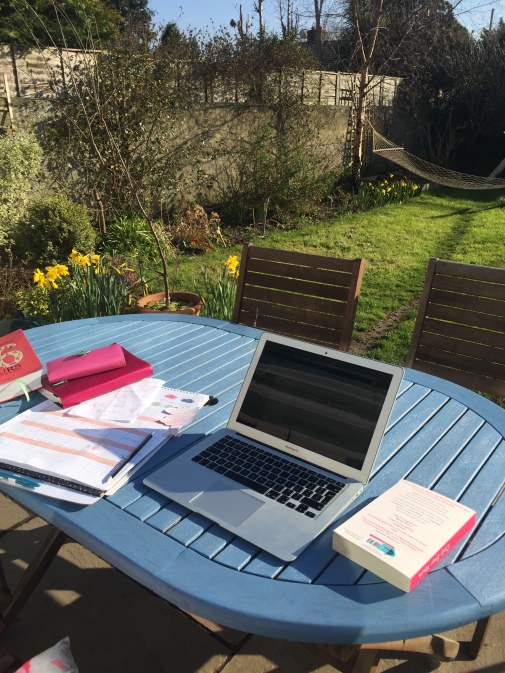 ming about the writers life and being rather glad I have one.
ming about the writers life and being rather glad I have one.

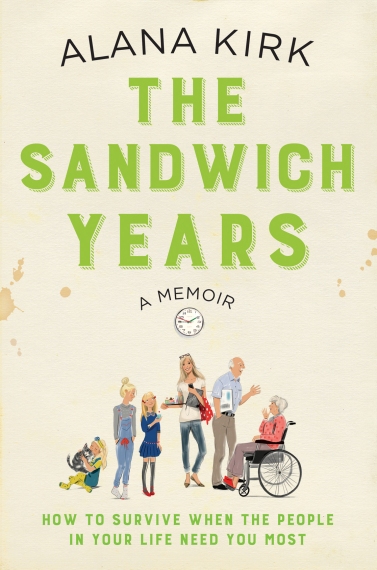 2016 is being hailed as a brutal year for so many reasons, and for me personally it was also very mixed. My first book was published making a life-long dream come true. But sadly my lovely mum died on the publication day of the book about her. Daughter, Mother, Me: a memoir of love, loss and dirty dishes follows my story of being caught in as tsunami of care, after my mum had a stroke just four days after my third baby was born, and became a bestseller.
2016 is being hailed as a brutal year for so many reasons, and for me personally it was also very mixed. My first book was published making a life-long dream come true. But sadly my lovely mum died on the publication day of the book about her. Daughter, Mother, Me: a memoir of love, loss and dirty dishes follows my story of being caught in as tsunami of care, after my mum had a stroke just four days after my third baby was born, and became a bestseller.
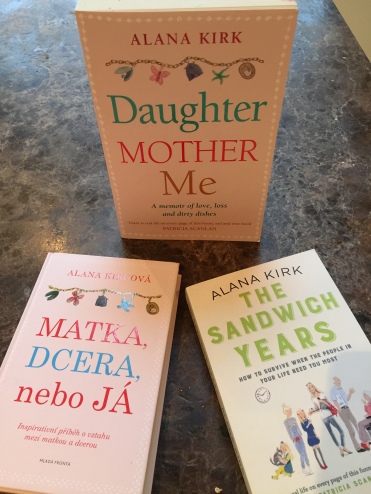 It has now been translated into Czech and is being launched there shortly. The paperback version of my book is coming out in January – with a new title The Sandwich Years, with an added chapter.
It has now been translated into Czech and is being launched there shortly. The paperback version of my book is coming out in January – with a new title The Sandwich Years, with an added chapter. But for me it was about emersion. I literally emerged myself in it’s freezing waters, but also in the atmosphere.
But for me it was about emersion. I literally emerged myself in it’s freezing waters, but also in the atmosphere.
 It seems bad to swear when I’m in such a beautiful and tranquil place… at the artist residency
It seems bad to swear when I’m in such a beautiful and tranquil place… at the artist residency 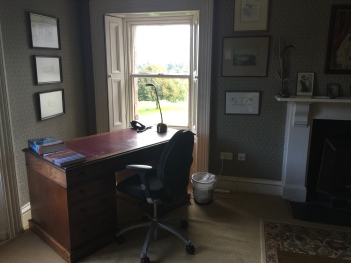 e, inside and out, like a literary hobo. A week to write! What a luxury. It felt like an indulgence. My day job is writing as a copywriter for the non-profit sector. My second job is writing as a freelance journalist for various newspapers and magazines. My third job is as a non-fiction author, so my hobby is to write fiction. And it felt so insane to wake up in the first morning with no kids, no food to think about, shop for, beat into edible shape, no dog to walk, no washing to hang out, no deadlines to die for, no TV to watch, no ‘work’ to do….. just long, long days to write. I was so jittery the first day with the fear of having to unleash that creativity with no clock to let me off the hook, that I went running in the glorious autumnal forest, drank tea with other writers, with composers, with artists until I settled down and began to feel the magic of this place.
e, inside and out, like a literary hobo. A week to write! What a luxury. It felt like an indulgence. My day job is writing as a copywriter for the non-profit sector. My second job is writing as a freelance journalist for various newspapers and magazines. My third job is as a non-fiction author, so my hobby is to write fiction. And it felt so insane to wake up in the first morning with no kids, no food to think about, shop for, beat into edible shape, no dog to walk, no washing to hang out, no deadlines to die for, no TV to watch, no ‘work’ to do….. just long, long days to write. I was so jittery the first day with the fear of having to unleash that creativity with no clock to let me off the hook, that I went running in the glorious autumnal forest, drank tea with other writers, with composers, with artists until I settled down and began to feel the magic of this place.